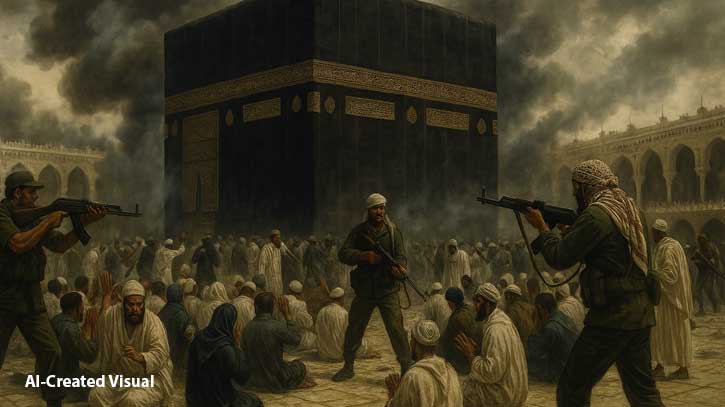In the long history of Islam, few events have shaken the Muslim world like the tragic incident that took place on 20 November 1979, corresponding to 1st Muharram, 1400 Hijri. What should have been a peaceful morning prayer at Masjid al-Haram in Makkah turned into a shocking scene of violence, confusion, and bloodshed—not by non-believers, but by a group who claimed to be devout Muslims.
As worshippers gathered for Fajr prayer, gunfire suddenly echoed through the sacred sanctuary. The congregation sat stunned. A man took the microphone from the imam and began to speak—his name was Juhayman al-Otaybi.
Juhayman launched into a fiery sermon, condemning the global state of the Muslim world, claiming it was a time of fitnah and moral decay. He asserted that the signs of the Last Day, as foretold by the Prophet Muhammad ﷺ, had begun to appear. Then he introduced a man standing beside him: Muhammad bin Abdullah, a member of the Quraysh tribe—whom he declared to be Imam Mahdi, the awaited savior of Islam.
Following the hadith descriptions, his name, his father’s name, and his lineage matched. Juhayman urged everyone present to give bay’ah (allegiance) to this self-declared Mahdi. Many in the mosque were left in disbelief.
But Juhayman had come prepared—with a large group of followers, armed with automatic and semi-automatic weapons. They killed the guards of the Kaaba and anyone who resisted. Snipers were stationed in the minarets to prevent any intervention. They even brought in weapons hidden inside empty coffins, pretending they were there for funeral prayers.
As the chaos unfolded, the Saudi government was paralyzed. No one had ever imagined such a rebellion could happen inside the holiest site in Islam. The idea of entering the Haram with weapons went against every Islamic principle. But as days passed, and innocent worshippers remained trapped without food or water, the government had to act.
Islamic scholars issued a fatwa, declaring that force could be used to free the mosque and save lives. The Saudi military launched an operation—using tanks, paratroopers, and heavy weaponry. But initial attempts failed. A grenade was thrown inside a tank, causing heavy casualties. Juhayman’s followers took this as a divine sign: “Look, Allah is with us,” they claimed.
The siege dragged on for nearly two weeks. The situation worsened. The Saudi government sought assistance from French Special Forces (Commandos Marine) to overcome the insurgents, who provided training, equipment, and tactical support.
Finally, a full-scale assault was launched. A fierce battle unfolded inside Masjid al-Haram. Many of the insurgents were killed, including the man declared to be Imam Mahdi. Juhayman al-Otaybi and 70 of his followers were captured alive.
In the aftermath, 69 of them were publicly executed by beheading. Only one was spared due to being underage. Their confessions—most of which were never made public—revealed deep planning and international involvement, with participants from Saudi Arabia, Pakistan, Egypt, and other countries
The Shockwaves and the Aftermath
This incident forever changed the way the Saudi kingdom handled security in Makkah and Madinah. Since then, security protocols for Hajj and Umrah have become extremely strict, and the Grand Mosque is now among the most protected religious sites on Earth.
This was the first time since the failed invasion by Abraha—before the Prophet Muhammad ﷺ’s birth—that Masjid al-Haram was directly attacked. Back then, Allah sent Ababil birds to protect the Kaaba. But this time, the attackers were Muslims themselves, making the tragedy even more painful.
The Prophet ﷺ said:
“When you see the black banners coming from Khorasan, go to them, for among them is the Caliph of Allah, the Mahdi.”
(Hadith – Sunan Ibn Majah)
Juhayman and his followers used such hadith to stage a twisted reenactment, manipulating sacred prophecies to justify bloodshed in the holiest of places.
Reflection: A Tragedy Within
This event remains a dark stain in the history of the Ummah—a moment when misguided beliefs, radicalism, and manipulation led to bloodshed in the most sacred space of Islam. It reminds us that fitnah can emerge from within, and even those who wear the label of Islam can stray dangerously far from its teachings.
We ask Allah ﷻ to protect His house from all evil, and to shield the hearts of Muslims from being led astray by false leaders, deception, or extremism.
اللَّهُمَّ احْفَظْ بَيْتَكَ الْحَرَامَ وَأُمَّةَ مُحَمَّدٍ ﷺ مِنَ الْفِتَنِ، مَا ظَهَرَ مِنْهَا وَمَا بَطَنَ
O Allah, protect Your Sacred House and the Ummah of Muhammad ﷺ from all trials—those that are apparent and those that are hidden.

